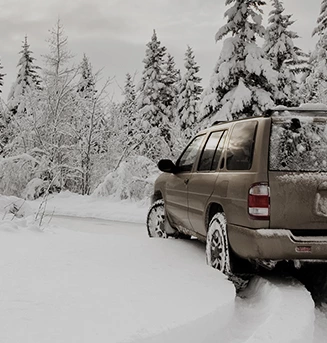No Fountain of Youth (Aging Tires)
August 23, 2020
Can you think of anyone who enjoys aging? Wrinkles where you don't want them, gray hair, eyes that won't focus any more, no stamina.
Believe it or not, your tires age, too, and they don't get better the older they get. And here's the important thing to know, even if they can still pass a tread depth test, they may simply be too old to be safe
Here's the best way to understand this. Have you ever found an old deck of playing cards with a rubber band wrapped around them? Try stretching the rubber band. SNAP! It's all cracked and brittle. And you haven't stressed that rubber one bit since the time you put them in that drawer.
Now you know what's happening to your tires. Rubber ages. Just like us, the day we come into the world, we start to go downhill (no pun intended). Oh, engineers are able to make a tire last longer than ever before. But that gas that keeps us alive—oxygen—seems to love to chemically mix with some components in rubber. Oxidation causes rubber to become hard and brittle. The rubber band test.
Is there an age test that can tell you when a tire is tool old to roll? Well, not really. They don't all age the same. Hot climates can make tires wear out more quickly. Some experts say a tire can last up to 10 years but should be inspected every year after the age of five. Others say tires should have an expiration date at six years old.
Since no one would ever ask a tire its age, how do you know how old one is? Believe it or not, tires made after the year 2000 have a date code stamped on either the inside or the outside of the sidewall. It's a four-digit numbers; the first two tell you the week, the second two tell you the year. So if it has the number 1916, it was made in the 21st week of 2016.
Another way to find out if your tires still have enough life in them is to have your vehicle service facility inspect them. They look for signs of age, such as developing cracks in the rubber, the condition of the sidewalls and, of course, that old standby: tread. If it's time to "retire" them, discuss options with your service advisor.
Sterling Tire & Auto
34701 Van Dyke Rd
Sterling Heights, Michigan 48312
586-264-7775
Need Service?
More articles from Sterling Tire & Auto

Losing Your Cool (Why is My Air Conditioning System Not Working?)
January 25, 2026
When you turn on the air conditioning in your vehicle, you expect cool air to come out of the vents. You depend on it, especially in hot weather, but it can also be important in humid weather when you need it to help defrost your windows and windshield. The air conditioning system has a lot of p... More

Why Maintaining Your Windshield Wipers and Washers Matters (Windshield Wiper and Washer Inspection)
January 18, 2026
What do mud, bird droppings and frost all have in common? When theyre covering your windshield, they can temporarily obscure your view of the road, leaving you driving blind. And when you cant see the road clearly ahead of you, it can be really scary. Thats one of the reasons its important to m... More

Why is My Brake Pedal Hard to Push?
January 11, 2026
When you push on your brake pedal, you should find your vehicle easy to stop. But at some point, you might notice stopping takes much more pressure on the pedal than it used to. When it gets to that point it becomes a safety issue, and you should bring your vehicle in so we can track down whats... More








